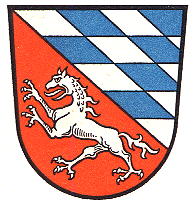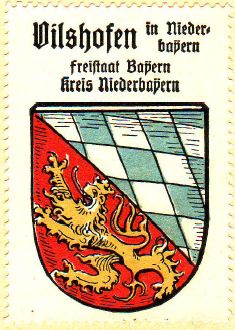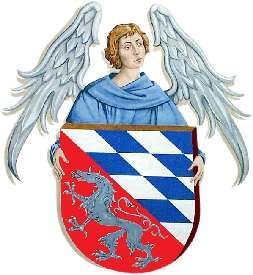Vilshofen an der Donau: Difference between revisions
Knorrepoes (talk | contribs) m (Text replacement - "====Official blazon==== " to "====Official blazon==== (de) ") |
Knorrepoes (talk | contribs) m (Text replacement - "====Origin/meaning====" to "===Origin/meaning===") |
||
| Line 12: | Line 12: | ||
(de) Schräg geteilt; oben waagrechte bayerische Rauten, unten in Rot ein schreitender silberner Panter. | (de) Schräg geteilt; oben waagrechte bayerische Rauten, unten in Rot ein schreitender silberner Panter. | ||
===Origin/meaning=== | |||
The arms were officially granted on September 24, 1956. | The arms were officially granted on September 24, 1956. | ||
Revision as of 19:27, 22 June 2017
This page is part of the German heraldry portal Deutsche Wappensammlung |
Heraldry of the World |
|
German heraldry:
|
Selected collector's items from Germany:
|
VILSHOFEN AN DER DONAU
State : Bayern
District (Kreis) : Passau (until 1973 Vilshofen)
Additions : 1972 Aunkirchen; 1978 Alkofen, Pleinting, Sandbach (partly), Zeitlarn
Official blazon
(de) Schräg geteilt; oben waagrechte bayerische Rauten, unten in Rot ein schreitender silberner Panter.
Origin/meaning
The arms were officially granted on September 24, 1956.
The arms are a combination of the panther of the Spanheim family and the diamonds of Bayern. The Counts of Spanheim founded the city in 1206, but already in 1241 the city became part of Bayern. The combination first appears in the seal from 1434, and the arms have basically not changed since. The only difference is that from the 16th century until 1956 the panther was officially described as a lion, from 1830 as a crowned lion, see below.
When the present arms were granted in 1956 the panther was restored. Presently the city uses an angel behind the shield as supporter. This angel is not officially granted.
| The arms by Hupp in the Kaffee Hag albums +/- 1925 |
The arms with an angel supporter |
Contact and Support
Partners:
Your logo here ?
Contact us
© since 1995, Heraldry of the World, Ralf Hartemink 
Index of the site
Literature : Stadler, 1964-1971, 8 volumes; Hupp, O: Kaffee Hag albums, 1920s














